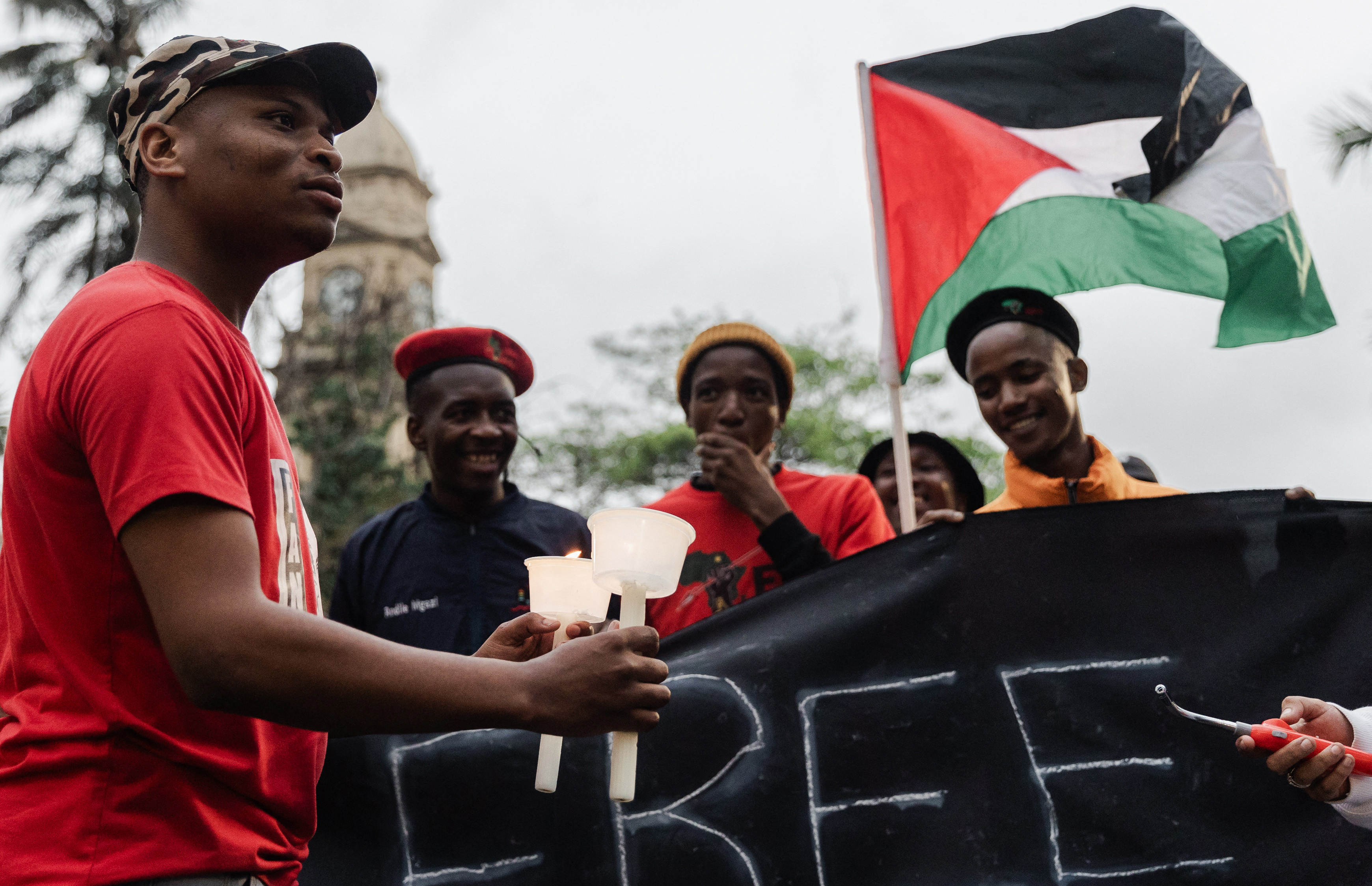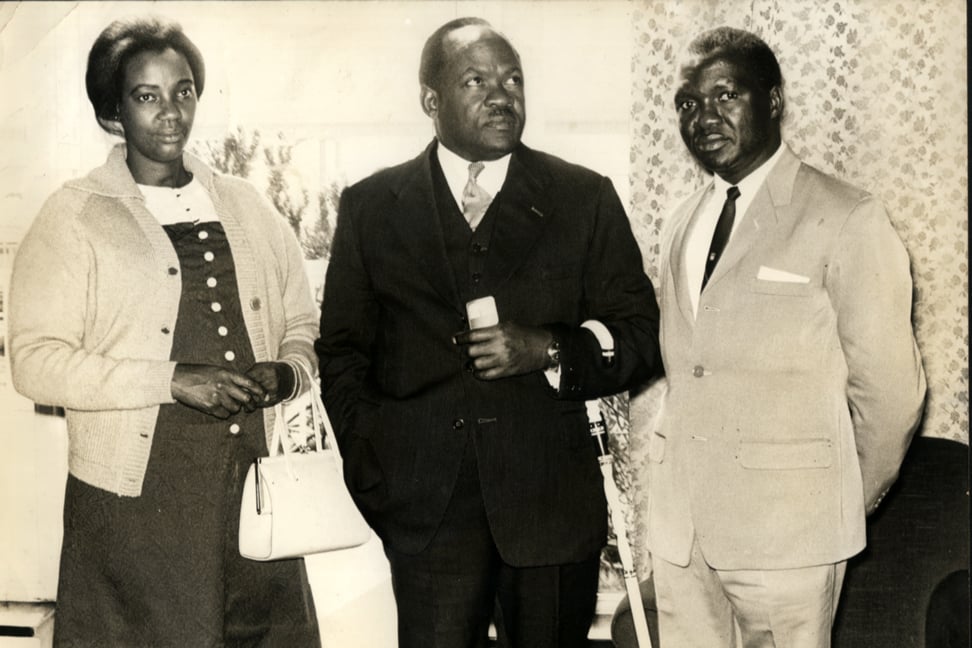Prime
Why Africa often sided with Palestine in conflict with Israel

Israeli Prime Minister Benjamin Netanyahu (left) is welcomed by President Museveni (right) at State House Entebbe in 2020. Mr Netanyahu was on a tour of Africa as he sought to bolster his country’s influence on the continent. PHOTOS/ FILE
What you need to know:
- For decades, African countries have claimed their support for the Palestinian cause is unwavering, but Israel’s foreign policy, in which it forges political, economic and military alliances with a number of African countries, has put the support under question, writes Derrick Kiyonga.
When Hamas gunmen left a trail of terror in Israel, having found a way around and in between the concrete wall that Israel has spent a year putting together – in the process killing hundreds of people – Ugandan President Museveni gave a very brief response.
In a judiciously crafted short message posted on social media, Museveni said the rekindled violence was regrettable. He questioned why the Israelis and the Palestinians don’t implement the two-state solution.
Museveni didn’t expound much about these two solutions, but he was alluding to the 1993 agreement dubbed the Oslo Accords in which the Israeli government and the Palestine Liberation Organisation (PLO), the internationally recognised entity that presides over the West Bank, agreed on a plan to implement a two-state solution, leading to the establishment of the Palestinian Authority (PA).
The two-state solution anticipated by the Oslo Accords was agreed to after of a succession of antique events. After the fall of the Ottoman Empire, Jews and Arabs both claimed the right to self-government in historical Palestine.
A first attempt at partitioning the land in 1948 resulted in an Israeli state, but no Palestinian state, and the West Bank and Gaza Strip fell under Jordanian and Egyptian rule, respectively.
In the Six-Day War of 1967, the Israeli army routed the combined Arab forces leading to its capture of the West Bank, the Gaza Strip, and other Arab territories, which in the aftershock led to the idea that Israel would exchange land it had captured for peace with its Arab neighbours, including, eventually, the Palestinians.
Violence between Israelis, Palestinians
Over the year’s, violence has intermittently broken out between the Israelis and the Palestinians but the recent violence has left the world in shock owing to the number of civilians – including children – who have been killed.
“To be condemned, in particular, is the practice of targeting civilians and non-combatants by the belligerents,” Museveni said without apportioning blame.

South African students hold a candle light vigil and a prayer for Gaza and Palestine in central Durban on October 9. PHOTO/ AFP
Although Museveni seemed not to want to take sides, the South African government under the African National Congress (ANC) apportioned the blame on the Israelis, including “the continued illegal occupation of Palestine land, continued settlement expansion, desecration of the Al Aqsa Mosque and Christian holy sites, and ongoing oppression of the Palestinian people”.
The ANC, which took over power after the end of the Apartheid regime, issued a blunter statement equating what the Palestinians are going through to what Black South Africans went through during the racial segregation policies imposed by the White minority regime over the Black majority.
“It can no longer be disputed that South Africa’s apartheid history is occupied Palestine’s reality… the decision by Palestinians to respond to the brutality of the settler Israeli apartheid regime is unsurprising,” Mahlengi Bhengu-Motsiri, the ANC spokesperson, said.
Historically, African countries have tended to support the Palestinian cause against Israel, drawing parallels with their own anti-colonial movements.

Former South African president Nelson Mandela (left) and former Palestinian leader Yasser Arafat (centre).
Upon his release from prison where he had spent 27 years, Nelson Mandela, South Africa’s first Black president, reiterated his support for the PLO which at that time was still viewed as a terrorist organisation by Israel and its ally the United States.
“We identify with the PLO because, just like ourselves, they are fighting for the right of self-determination,” he said. “Yasser Arafat, then leader of the PLO, was a comrade in arms, and they treat him as such.”
Although it’s generally agreed that African countries have sided with Palestine, not all of them have gone along.
For instance, Uganda’s different governments have tilted depending on their objectives. Even before Uganda got independence, Israel had positioned itself as an ally and devoted great effort and resources to cultivating relations in the East African country.
By independence and post-independence, Israeli companies had invested and not only worked in Uganda’s agriculture and education sectors, but they had also worked on paving roads, building airports, constructing houses, and developing water resources.
“Uganda’s special place, however, came not only from distant memories of the Uganda plan to settle Jews there in the early 20th Century, but also from its strategic importance since it bordered an Arab country, Sudan... Uganda was also a link in a chain of African countries surrounding hostile Arab ones, mainly Sudan and Egypt,” Israeli historian Arye Oded writes in his paper ‘Israeli-Ugandan Relations in the Time of Idi Amin’.
At the start of Milton Obote’s presidency, in 1966, Uganda continued to be in the good books of Israel. This was manifested when Obote made the decision to assist the Anyanya fighters of southern Sudan, who sought to secede from the north.
This intervention in Sudan had an invisible hand: shortly after the 1967 Six-Day War – the war between Israel and a coalition of Arab states primarily comprising Jordan, Syria, and Egypt – the Jewish state sold Uganda weapons worth $7 million.
By 1969, Israel was channelling weapons through Uganda into southern Sudan, where the Anyanya, a ragtag rebel outfit, had been fighting the Arab-dominated Sudanese government since the 1950s.
Israel’s intention was to befuddle the Sudanese army so that it would not join forces with Egypt, which was rallying to retaliate for the seizure of the Sinai Peninsula – a sparsely populated desert enclave between the Red Sea and the Mediterranean Sea.
Obote’s relationship with Israelis didn’t last long as a couple of his foreign policy moves, including hobnobbing with the Arab world, didn’t sit down well with them together with the British and it is said they played a major role in helping Idi Amin, a capricious semi-illiterate army General, to oust him from power via a coup.
The Israelis denied having a hand in the coup, saying they were just military personnel in Uganda who were strictly advisors and couldn’t be linked.
Unsurprisingly only two countries – Israel and Britain – which had developed a loathing for Obote, seemed willing to recognise Amin’s regime without further ado.
Soon after taking power, Amin, who had suspended the Constitution, visited Britain in July 1971 where he was promised a lot of gifts.
“He was welcomed and offered sophisticated military equipment— but not Harrier jets—provided that he paid for it. Apparently, the British expected him to restore their traditionally prominent position in Uganda. They also agreed to establish a military academy and a technical training school, and selected officers began to attend courses in Britain, while a British military team arrived in Uganda,” Susan Aurelia Gitelson says in her research ‘Major Shifts in Uganda’s Foreign Policy’.
Amin, who was Muslim, also visited Israel in 1971, begging for weaponry.
“Amin visited Israel twice in July 1971 to obtain support and arms. He wished at this time to invade Tanzania in order to gain an outlet to the sea through the Indian Ocean port of Tanga. He also wanted Phantom jet-fighters, armed boats to take his troops across Lake Victoria to Tanzania, helicopters, and a $10 million grant,” Gitelson says, adding that the Israelis, however, could not meet his demands, although they did supply the small executive jet he requested.
Amin would soon team up with Libya’s Muammar Gaddafi – who in 1969 had led a bloodless coup in which King Idris was ousted – guaranteeing to base their regimes on Islam and expressing support for the Arab struggle against “Zionism and imperialism,” for the liberation of the captured Arab territories, and for “the right of return of the Palestinian people to their homes”.
Gaddafi agreed to sell jets to Uganda, but on condition that Amin had to break off ties with Israel. The desperate Amin ejected all Israelis from the country, fixed the Palestine Liberation Organisation in the former Israeli Embassy, and began the construction of a giant mosque in downtown Kampala.
It didn’t come as a surprise when in 1976 Amin allowed an Air France jet carrying around 240 passengers, 12 crew members, and four hijackers that had taken off from Athens Airport to land at Entebbe International Airport.
Most of those hostages who were not Israeli were released. In exchange for the freedom of the remaining hostages, the hijackers, who claimed to represent the Popular Front for the Liberation of Palestine, demanded the release of 53 pro-Palestinian militants from Israeli and European jails.
On July 4, 1976, nearly all the hostages were freed in an Israeli commando raid led by Jonathan Netanyahu, the brother of Benjamin Netanyahu, Israel’s current prime minister.
In a movie-like scene, Jonathan himself was killed during the rescue operation by sniper fire from the airport control tower.

Former Ugandan President Idi Amin.
“I request that international organisations for which VOA [Voice of America] are respective spokesmen should be fully briefed on this incident and that Israel should be condemned in the strongest possible terms for this aggression,” Amin responded in the aftermath of the raid.
“In the meantime, Uganda reserves her right to retaliate in whatever way she can to redress the aggression on her,” he added.
After Israel’s relationship with Africa went through a downward spiral, the emergency of presidents such as Museveni on the continent has reignited the bond.
Opening an embassy in Jerusalem
When Netanyahu visited Uganda in 2020, Museveni said Uganda was studying the possibility of opening an embassy in Jerusalem – a city contested by the Jews and Palestinians.
If Museveni was to fulfil the promise to Netanyahu, it would strengthen Israel’s claim for the city of Jerusalem to be its capital.
“If a friend says I want your embassy here rather than there I don’t see why there would be...,” Museveni said. “We are really working, we’re studying that.”
“You open an embassy in Jerusalem and I will open an embassy in Kampala,” Netanyahu promised. “We hope to do this in the near future.”
Two years after Netanyahu visited Uganda, Kampala announced, without giving specifics, how it had signed a defence agreement with Israel.
“The agreement renews and strengthens the existing historical relationship between the two countries on matters concerning defence, security, and welfare, among others,” the Ministry of Defence said in a statement.
Israel’s charm offensive in Africa reached to a point when in 2021 it was given an observer status of the African Union Commission still triggering protests from countries led by South Africa saying the decision had been taken without consulting members.
“Under pressure, earlier this year, the African Union suspended Israel’s observer status. The status is suspended until such time as this committee can deliberate … and so we did not invite Israeli officials to our summit,” Moussa Faki, AU Commission chief, said.
Still, Israel has its unapologetic backers on the continent with Kenya’s William Ruto coming out strongly to support its response in light of the Hama’s recent incursion into Israeli territory.
“Kenya joins the rest of the world in solidarity with the State of Israel and unequivocally condemns terrorism and attacks on innocent civilians in the country,” Ruto said.





